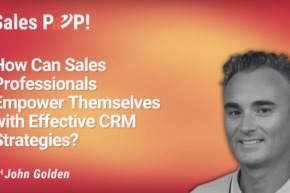In a recent episode host John Golden engages in a thought-provoking conversation with Deb Coviello, known as the “Drop In CEO.” Deb is an accomplished author, podcaster, and consultant who specializes in guiding CEOs and leaders through the complexities of modern business challenges with empathy and strategic insight. This episode delves into the leadership hurdles faced by CEOs, especially in the rapidly evolving business landscape, and the importance of self-awareness, seeking help, and cultivating a positive organizational culture.
Key Themes and Insights
1. The Concept of the CEO’s Compass
Deb introduces her book, “The CEO’s Compass,” which serves as a guide for leaders to regain their confidence and navigate through turbulent times. The compass metaphor represents seven key points that lead to peace of mind, emphasizing that success is not just about achieving results but also about finding a sense of direction and fulfillment in leadership.
Actionable Advice:
- Identify Your True North: Determine your core values and principles that guide your decision-making process.
- Assess Your Current Position: Regularly evaluate where you and your organization stand in relation to your goals.
- Set Clear Milestones: Break down your long-term vision into achievable short-term goals.
2. Navigating Change and Crisis
Both speakers acknowledge that CEOs often face significant challenges when their traditional methods no longer yield results. Deb highlights the importance of recognizing when to seek external help, as many leaders struggle with pride or fear of judgment. She encourages CEOs to have the courage to reach out for support, emphasizing that collaboration and leveraging the expertise of others are crucial in today’s complex business environment.
Actionable Advice:
- Build a Support Network: Cultivate relationships with mentors, peers, and consultants who can provide objective advice.
- Embrace Vulnerability: Understand that seeking help is a strength, not a weakness.
- Leverage External Expertise: Bring in specialists to address specific challenges and provide fresh perspectives.
3. The Role of a CEO as a Generalist
Deb discusses the evolution of the CEO role, noting that while many leaders may have risen through the ranks with specific expertise, they must now embrace a more generalist approach. This involves understanding their limitations and surrounding themselves with talented individuals who can fill in the gaps. The focus should be on strategic oversight rather than micromanagement.
Actionable Advice:
- Delegate Effectively: Trust your team to handle operational details while you focus on strategic direction.
- Foster Cross-Functional Collaboration: Encourage departments to work together to achieve common goals.
- Continuously Learn: Stay informed about various aspects of the business to make well-rounded decisions.
4. Fostering a Positive Organizational Culture
The conversation shifts to the significance of organizational culture, especially in a hybrid work environment. Deb argues that a strong culture transcends physical boundaries and is built on genuine human connections. Leaders must prioritize understanding their team members, recognizing their contributions, and fostering an environment where everyone feels valued.
Actionable Advice:
- Promote Open Communication: Create channels for transparent and honest dialogue within the organization.
- Recognize and Reward Contributions: Regularly acknowledge the efforts and achievements of your team members.
- Build Trust: Demonstrate reliability and integrity in your actions to earn the trust of your employees.
5. Strengths-Based Leadership
Deb emphasizes the importance of focusing on employees’ strengths rather than their weaknesses. By identifying and nurturing individual talents, leaders can unleash the full potential of their teams. She shares a success story of a client who improved performance by enriching the ecosystem around a strong production leader rather than trying to change the leader’s weaknesses.
Actionable Advice:
- Conduct Strengths Assessments: Use tools like Gallup’s StrengthsFinder to identify the unique strengths of your team members.
- Align Roles with Strengths: Assign tasks and responsibilities that align with each individual’s strengths.
- Provide Development Opportunities: Offer training and resources to help employees further develop their strengths.
6. The Importance of Recognition
Both speakers discuss the tendency of leaders to focus on mistakes rather than acknowledging successes. Deb stresses the need for leaders to catch their team members doing things right and to celebrate those achievements. This recognition fosters a positive atmosphere and encourages continued excellence.
Actionable Advice:
- Implement Recognition Programs: Establish formal programs to regularly recognize and reward outstanding performance.
- Celebrate Small Wins: Acknowledge and celebrate even minor achievements to boost morale.
- Provide Constructive Feedback: Balance constructive criticism with positive reinforcement.
7. The Value of Coaching
Deb and John both advocate for the power of coaching in leadership development. They share personal experiences of how coaching has helped them gain clarity and confidence in their roles. Deb highlights that a good coach can provide an objective perspective and help leaders see their potential, which is often obscured by self-doubt.
Actionable Advice:
- Seek Out a Coach: Find a coach who can provide guidance and support tailored to your specific needs.
- Engage in Regular Coaching Sessions: Schedule consistent sessions to maintain momentum and accountability.
- Be Open to Feedback: Embrace the insights and suggestions provided by your coach to facilitate growth.
8. Adapting to the New Nature of Work
The discussion touches on the changes in work dynamics brought about by the COVID-19 pandemic. Deb argues that while remote work has presented challenges, it has also revealed underlying issues in organizational culture that may have existed prior. Leaders must address these cultural gaps to ensure engagement and connection, regardless of physical location.
Actionable Advice:
- Enhance Virtual Communication: Utilize technology to maintain strong communication and collaboration among remote teams.
- Foster Inclusivity: Ensure that remote employees feel included and valued in the organization.
- Monitor Well-Being: Regularly check in on the mental and emotional well-being of your team members.
9. Defining and Cultivating Culture
Deb explains that culture is not merely defined by slogans or mission statements but is reflected in the daily interactions and behaviors within the organization. A strong culture is built on mutual respect, acknowledgment, and support among team members. The CEO plays a crucial role in fostering this environment by leading with empathy and authenticity.
Actionable Advice:
- Lead by Example: Demonstrate the values and behaviors you want to see in your organization.
- Encourage Team Building: Organize activities and events that promote camaraderie and teamwork.
- Solicit Feedback: Regularly gather input from employees to understand their perspectives and improve the culture.
10. Advice for CEOs Moving into 2025
As the episode concludes, Deb offers a piece of advice for CEOs facing uncertainty: to pause and reflect. She encourages leaders to take time to acknowledge their achievements and the emotions tied to their experiences, both positive and negative. This reflection is essential for personal growth and effective leadership moving forward.
Actionable Advice:
- Schedule Reflection Time: Set aside regular intervals for self-reflection and assessment.
- Celebrate Milestones: Recognize and celebrate the progress and achievements of your organization.
- Plan for the Future: Use insights gained from reflection to inform strategic planning and decision-making.
Conclusion
This episode provides valuable insights into the evolving role of CEOs in a complex business landscape. Deb Coviello’s expertise in leadership, culture, and personal development offers a roadmap for leaders seeking to navigate challenges with confidence and empathy. The conversation underscores the importance of self-awareness, collaboration, and fostering a positive organizational culture as essential components of successful leadership in the modern era.
By implementing the actionable advice shared in this episode, leaders can enhance their effectiveness, build stronger teams, and create a more resilient and thriving organization. As you move forward, remember to prioritize peace of mind, embrace vulnerability, and continuously strive for growth and improvement.
Our Host
John is the Amazon bestselling author of Winning the Battle for Sales: Lessons on Closing Every Deal from the World’s Greatest Military Victories and Social Upheaval: How to Win at Social Selling. A globally acknowledged Sales & Marketing thought leader, speaker, and strategist, he has conducted over 1500 video interviews of thought leaders for Sales POP! online sales magazine & YouTube Channel and for audio podcast channels where Sales POP! is rated in the top 2% of most popular shows out of 3,320,580 podcasts globally, ranked by Listen Score. He is CSMO at Pipeliner CRM. In his spare time, John is an avid Martial Artist.








Comments